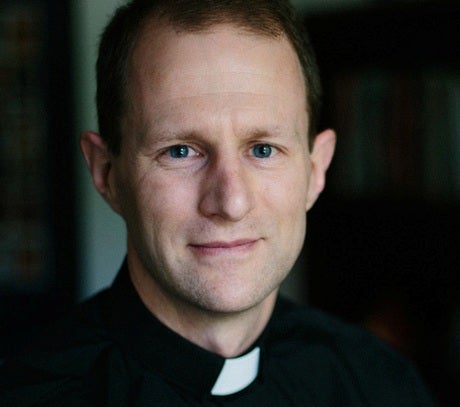What We Carry With Us: Part of the “As This Jesuit Sees It” Series
Written by Fr. Matthew Carnes, S.J., an Associate Professor and Director of the Center for Latin American Studies at Georgetown University. This article originally appeared on April 11th, 2017, in the Hoya and can be found online here. “As This Jesuit Sees It” appears every other Tuesday in the Hoya.
About four years ago, on a late April afternoon, I found myself racing through Dahlgren Quadrangle when I saw two students sitting on a bench. As I got closer, I recognized them as seniors who I had once taught and often saw around campus.
I approached them to say hello, until I noticed it looked like maybe they were crying. I awkwardly tried to look like I had not seen them, but it was too late. They meekly waved.
When I got to them, I nonchalantly tried to ask how they were doing. They looked at me and said — and now I saw there really were tears in their eyes — “This week we’re making a point of going to all of our places. Each day we’re going to a favorite place that made our Georgetown experience and spending a while remembering what happened there.” They mentioned a few: their freshmen rooms — they actually let you do that during Senior Week, a classroom where they had a seminar, each of their favorite spots in Lauinger Library, and now here they were in Dahlgren Quad.
They did not need to say anything more, as suddenly the tears in their eyes made sense — a kind of happy and sad, life-embracing and person-forming sense. And I could not help but feel a tear come to my eyes as well.
St. Ignatius, in one of his most famous prayers, suggests that our memory is sacred. The ability to remember is a gift from God, one that allows us to recall and relive the panoply of our experiences. It also allows us to see our own history afresh and to reinterpret and reappropriate it as not just a series of events, but as a narrative of who we are and who we are becoming. Memory helps us tell our story and see how the pieces fit together. And here these students were, engaging their memory to tell their story to themselves and to each other.
As we come to the close of this year, what will be the story we will tell? Which memories will we carry with us, and which will we let fade? Let’s face it — we have seen and experienced so much, individually and as a community. What will we choose to carry with us, and how will it fit into our story?
We carry memories of concrete events — some daily and mundane, some historic — and the many feelings of highs and lows associated with them. We recall our accomplishments and failings and hurts. We feel the reality of our world in all its brokenness and all its needs and all its potential, made even sharper in this year of election and inauguration, marches and resistance, refugees and travel bans.
We carry the experience of our loves and longings, simmering in our hearts even if we do not always speak of them. For some, it may have been the thrill of someone noticing us, perhaps romantically … or in the Georgetown context, perhaps intellectually — I once had a student who spoke of “intellectual crushes”!.
Or maybe we found ourselves connecting on a profound level with others who shared our commitments and passions. With them, we poured ourselves into conversations and dates and adventures and projects and service and retreats. To our surprise and delight, with them we came out of ourselves and felt marvelously alive.
And, importantly, we carry in our memory the first signposts of the path ahead. We carry our hopes and our fears about jobs and summers and future friendships. Deep inside, our dreams for eventual marriages and families and vocations that will give meaning to our lives — even if seemingly beyond the horizon — are nurtured. Our memories help shape the narrative of the kinds of parents and servants and contributors we want to be; they inspire us in our continued growth and our ongoing journey.
Ultimately, as those two seniors knew, our memory — and the process of remembering — helps us discover the narrative of who we are and who we are becoming. Our experiences themselves do not define us; we are neither our best nor our worst accomplishments. Instead, we are people discerning a sacred narrative, one that emerges as we look backward and forward.
So, find a friend and a bench, and take some time in the coming days to remember. If an awkward tear or uneasy laugh or smile comes along, or if you feel your heart rising or beating a bit faster, you are probably doing it right.
- Tagged
- Mission and Ministry
